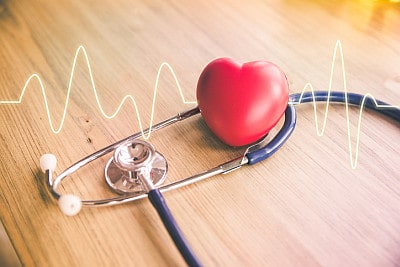Think cholesterol is yesterday’s news? Think again! Recent research shows that your cholesterol level is something that we all need to care about–regardless of age. What’s more, new studies show that there’s more than one type of diet that can help us maintain healthy blood cholesterol levels.
For this Ask the Expert column, we spoke with Dr. Kristina Petersen, Assistant Professor of Nutritional Sciences at Texas Tech and American Heart Association Nutrition Committee member. Here we tackle the topic of cholesterol, including new research as well as some basics, such as what it is, why you should care about it, and how you can manage cholesterol in your diet.
Since your personal health history and nutritional needs are so unique, take the time to talk with your doctor about your cholesterol level and what it means for your health.
Q: What is cholesterol and is there a difference between blood cholesterol and dietary cholesterol?
 Blood cholesterol is a waxy, fatlike substance that circulates in your blood. While it’s essential for good health, too much of the bad kind of blood cholesterol can put you at a higher risk of a range of health problems. The cholesterol in your blood comes from two sources: certain foods and your liver.
Blood cholesterol is a waxy, fatlike substance that circulates in your blood. While it’s essential for good health, too much of the bad kind of blood cholesterol can put you at a higher risk of a range of health problems. The cholesterol in your blood comes from two sources: certain foods and your liver.
Your liver makes all the cholesterol your body needs. Recent research shows that for most people, about half of your blood cholesterol levels are genetically determined. The other half is influenced by lifestyle factors, such as diet, exercise, body weight and smoking.
This means that your lifestyle choices have a significant influence on your cholesterol levels and cardiovascular health, starting in childhood!
Low-density lipoprotein (LDL) cholesterol is known as the bad kind of cholesterol. Too much LDL contributes to fatty build-ups in arteries. This narrows the arteries and increases the risk for cardiovascular diseases.
High density lipoprotein (HDL cholesterol) is called good cholesterol because it removes cholesterol from the bloodstream and the artery walls. A healthy HDL cholesterol level may be protective, while low levels of HDL cholesterol may raise the risk of heart disease and stroke.
Cholesterol is also found in certain foods. This type of cholesterol is known as dietary cholesterol. Dietary cholesterol is found in foods from animal sources, such as meats, liver and other organ meats, dairy foods, egg yolks, and shellfish. More on dietary cholesterol below.
Q: What if I’m young? Why should I care about cholesterol?
One common misconception about blood cholesterol is that it’s an issue only for people in midlife and beyond. However recent research[1] shows that cholesterol levels are something that everyone should pay attention to—even young adults.
We now know that the effects of high cholesterol are cumulative throughout the lifespan. Elevated blood cholesterol levels in childhood and young adulthood can take a toll on your cardiovascular system, increasing your risk of heart disease, stroke and heart attack.
Q: I feel great. Why do I need to get my cholesterol checked?
 High blood cholesterol doesn’t have symptoms, which is why getting your cholesterol levels checked is so important. You might look fit and feel terrific, but you could still have high cholesterol. Above normal blood cholesterol levels are correlated with cardiovascular disease, which remains the leading cause of death in the United States[2].
High blood cholesterol doesn’t have symptoms, which is why getting your cholesterol levels checked is so important. You might look fit and feel terrific, but you could still have high cholesterol. Above normal blood cholesterol levels are correlated with cardiovascular disease, which remains the leading cause of death in the United States[2].
Knowing your cholesterol status can help you stay in control of your health. If your numbers are high, there’s a lot you can do to turn things around! Lifestyle changes, such as a healthy diet and regular exercise, can help to lower cholesterol levels. In some cases, medication may be necessary to lower cholesterol levels to a healthy range.
The American Heart Association recommends that all adults 20 or older have their cholesterol and other traditional risk factors checked every four to six years as long as their risk remains low. After age 40, your health care professional will also want to use an equation to calculate your 10-year risk of having a heart attack or stroke.
People with cardiovascular disease, and those at elevated risk, may need their cholesterol and other risk factors assessed more often.[3]
Q: Where do triglycerides fit in?
Blood tests to assess your cholesterol levels also look at triglycerides. Triglycerides are the most common type of fat in the body. They store excess energy from your diet.
A high triglyceride level combined with high LDL (bad) cholesterol or low HDL (good) cholesterol is linked with fatty buildups within the artery walls, which increases the risk of heart attack and stroke.
Q: Should I avoid foods that are high in cholesterol?
 Although dietary cholesterol was once thought to be a primary driver of high blood cholesterol, more recent studies have shown that diets high in saturated fat are more correlated with high blood cholesterol.
Although dietary cholesterol was once thought to be a primary driver of high blood cholesterol, more recent studies have shown that diets high in saturated fat are more correlated with high blood cholesterol.
The American Heart Association recommends limiting saturated fats. By reducing saturated fats, you are more likely to have low intake of dietary cholesterol.
High saturated fat, cholesterol-rich foods include:
- Full-fat dairy (whole milk, butter, and full-fat yogurt and cheese)
- Red meat (steak, beef roast, ribs, pork chops, and ground beef)
- Organ meats (liver)
- Processed meat (bacon, sausage, salami, peperoni, and hot dogs)
- Baked goods and sweets (cookies, cakes, and doughnuts may contain butter or shortening, making them high in saturated fat and cholesterol)
Q: What kind of diet can help me keep my cholesterol in check?
The great news is that what you eat can play a major role in managing cholesterol and protecting your heart and cardiovascular system.
Want even more good news? A recent Scientific Statement from the American Heart Association[4] shows a variety of dietary patterns support healthy cholesterol levels, so there’s more than one approach to eating for heart health.
These include the Mediterranean-style diet, the DASH diet (Dietary Approaches to Stop Hypertension), plant-based/vegetarian styles (including lacto-ovo vegetarian, pescatarian diets), and vegan diets.
And the best news? Eating for a healthy heart can be delicious! You won’t have to sacrifice taste or feel deprived to keep your cholesterol in check.
What all heart-healthy dietary patterns have in common is a focus on fruits, vegetables, whole grains, plant proteins, and healthy fats. Plus they are naturally low in saturated fats, cholesterol, and sodium.
Q: Are there specific foods that can help me lower my cholesterol?
 Yes! Research shows that some foods may be particularly helpful in lowering cholesterol. These include:
Yes! Research shows that some foods may be particularly helpful in lowering cholesterol. These include:
- Oatmeal, oat bran and high-fiber foods, such as fruits and vegetables. Oatmeal contains soluble fiber, which can reduce LDL cholesterol. Soluble fiber is also found in such foods as kidney beans, Brussels sprouts, apples, berries, and pears. Soluble fiber can minimize the absorption of cholesterol into your bloodstream by binding to cholesterol and carrying it out of the body. Studies show that 5-10 grams or more of soluble fiber/day can decrease your LDL cholesterol.
- Fish and omega-3 fats. Although fatty fish and omega-3s from other food sources like walnuts, flax, avocados, and chia seeds don’t directly lower LDL cholesterol, they may help lower your triglycerides as well as having other health benefits. Fish with the highest levels of omega-3 fats include salmon, tuna, mackerel, herring, and trout.
- Nuts. Almonds, walnuts, and other tree nuts can improve blood cholesterol.
- Healthy oils in place of saturated fats. Swap out butter and other high saturated fat oils and instead use vegetable oil, canola oil, olive oil, and other healthy fats like those found in avocados and olives.
Q: Besides diet and genetics, what else influences my cholesterol?
In addition to what you eat, other lifestyle factors such as physical activity, smoking, and body weight can affect blood cholesterol levels. Aim to move more though both aerobic activity (walking, swimming, running) and strength training. If you smoke, speak with your healthcare provider to find out ways to help you quit.
Q: If I have high cholesterol, will dietary changes and exercise be enough to reduce my cholesterol to a normal range?
Lifestyle changes, like diet and exercise, are often not enough to reduce cholesterol to normal ranges. Many people require medication to lower their cholesterol levels. It’s important to discuss non-dietary approaches to lowering cholesterol with your healthcare provider.
Q: What are normal cholesterol levels?
Normal cholesterol levels vary based on many factors. Having heart disease or other risk factors can influence your LDL target. Speak with your healthcare provider about your test results and what they mean for you.
References
[1] https://www.sciencedirect.com/science/article/pii/S0735109718353798?via%3Dihub
[2] https://professional.heart.org/en/science-news/heart-disease-and-stroke-statistics-2023-update
[3] https://www.heart.org/en/health-topics/cholesterol/how-to-get-your-cholesterol-tested
[4] https://www.ahajournals.org/doi/10.1161/CIR.0000000000001146
Note: Since everyone’s health history and nutritional needs are so different, please make sure that you talk with your doctor and a registered dietitian to get advice about the diet and exercise plan that‘s right for you.

